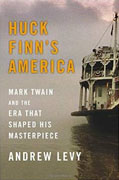Huck Finn's America
Andrew Levy
book reviews:
· general fiction
· chick lit/romance
· sci-fi/fantasy
· graphic novels
· nonfiction
· audio books
· author interviews
· children's books @
curledupkids.com
· DVD reviews @
curledupdvd.com
newsletter
win books
buy online
links
home
for authors
& publishers
for reviewers

 |
Huck Finn's America: Mark Twain and the Era That Shaped His Masterpiece Andrew Levy Simon and Schuster Hardcover 368 pages December 2014 |
|
A prevailing question, heard often in the halls of academia and the publishing circuits, asks if there can really be groundbreaking work written about literary classics. After all, how many new discoveries can await readers in novels that have been studied for decades, sometimes even centuries? By exploring Mark Twain’s classic novel The Adventures of Huckleberry Finn, Levy answers these questions with mostly positive results.
Despite this, Levy’s own ideas are not lost among the copious amounts of scholarship. His message somehow manages to escape the reading: Americans--especially educators and critics--have fundamentally misinterpreted one of our most treasured cultural successes. Though "misinterpreted" is perhaps too strong a word, since Levy suggests that our interpretation of Huckleberry Finn is not necessarily incorrect, but more that our society lacks understanding of Mark Twain’s complexities, so we have focused on the wrong elements of Huckleberry Finn. Levy presents a message of a missed forest because of trees, cliché though that may be. Levy’s ideas, though, are far from clichéd, and his assertions make this book stand out. He finds a studious niche that has not only merit but seems so obvious that it is amazing no one else has ever really examined it in detail. Perhaps that is because race, as it so often does in America, eclipses all else. That certainly seems to be the problem here as Levy illustrates with scrupulous detail that race is only a small part of Huckleberry Finn compared to children. Parenting, education, and the overall development of youth are larger issues of the story that have been overshadowed by racial study. At the time, there was a national hysteria regarding children--especially boys--a hysteria that Twain cultivated and simultaneously mocked with his careful storytelling. In developing this study, Levy helps the reader better understand parts of Huckleberry Finn, especially the novel’s ending, that have hitherto been downplayed or ignored. These theories do not harm a reader’s view of the novel; instead, they use scrupulous examination to deepen the appreciation of a classic. Aside from literary exploration, the book promises with its subtitle (“…the Era that shaped his masterpiece”) a historical view of America, and it does not disappoint. However, the dual role of historian and literary critic, so often symbiotic, seems at odds here. Certainly, it is necessary to study the time period in which a work is set. However, the book’s pace slows whenever Levy deviates from Twain’s works. This dullness is especially present in the details of Twain’s tour and the figures surrounding it. Such dullness does prepare the reader for the grander literary theories that Levy presents. When he returns to literary analysis, Levy’s writing is more enthusiastic and engaging than when he compiles historical details. In the end, this book furthers comprehension of America’s history, culture, and literature to ultimately create a further understanding of America. Levy says, “And mistaking a dark comedy about how history goes round for a parable about how it goes forward is a classic American mistake” (184). If that is so, and Levy makes a strong argument that it is, then qualities that we hold in high esteem--optimism and progress--are erroneous. Such a conclusion seems inevitable after reading Levy’s analysis, and such a warped view seems cynical and self-defeating, even if it is truthful. Fortunately, there is a quality of redemptive humor in that literature mostly explores truth. Thus, with Levy’s help, Mark Twain has the last laugh. Originally published on Curled Up With A Good Book at www.curledup.com. © Joshua Myers, 2015 |
|
|
|
 Click here to learn more about this month's sponsor! |
|
| fiction · sf/f · comic books · nonfiction · audio newsletter · free book contest · buy books online review index · links · · authors & publishers reviewers |
|
| site by ELBO Computing Resources, Inc. | |
 Such an outcome may be part of the book’s hefty research, which relies heavily on multiple sources and (seemingly) endless quotes. The work finishes at just under 200 pages and looks much thicker due to the massive amount of notes at the end. Levy has clearly researched well, and his acquaintance with knowledge of the era, Twain’s life, and Twain’s works is presented in an easy-going prose that reflects a comfortable yet precise familiarity with the subject at hand. However, this affable writing style weakens Levy’s voice, which becomes lost in the book’s middle. Until the assertiveness of the book’s latter chapter, Levy seems just another scholar among many, struggling to be heard above the din.
Such an outcome may be part of the book’s hefty research, which relies heavily on multiple sources and (seemingly) endless quotes. The work finishes at just under 200 pages and looks much thicker due to the massive amount of notes at the end. Levy has clearly researched well, and his acquaintance with knowledge of the era, Twain’s life, and Twain’s works is presented in an easy-going prose that reflects a comfortable yet precise familiarity with the subject at hand. However, this affable writing style weakens Levy’s voice, which becomes lost in the book’s middle. Until the assertiveness of the book’s latter chapter, Levy seems just another scholar among many, struggling to be heard above the din.